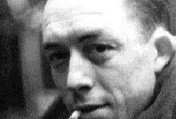Albert Camus, an outstanding French writer, essayist and philosopher, was born in French Algeria in 1913. He studied at the Department of Philosophy of the Algerian University, engaged in theatre and public activities, published his works in left-wing editions, and issued a collection of lyrical essays entitled Betwixt and Between (1937) and Nuptials (1939).
In 1934-1937 he was a member of the Communist Party. In 1938 Camus moved to France. During the war he joined the French Resistance cell “Combat” which published an underground newspaper of the same name. During the war two works by Camus that made him famous came out in print — a novel The Stranger and an essay The Myth of Sisyphus. His fame grew father after the premiere of the play Caligula that opened shortly after the war and looked into the problem of the universal evil. The play based on Suetonius's Twelve Caesars was written shortly before World War Two broke out and at the time when the author was an actor with an amateur theatre at Radio Algeria. Camus intended to appear in the title role. The play was officially premiered at Eberto Theatre in Paris in December 1945 introducing young actor Gerard Philipe in the title role. The play was unanimously acclaimed by critics as the writer's best piece of drama and gave start to Gerard Philipe's spectacular career in theatre and film. In 1947 Camus's novel The Plague came out. Next followed the plays The State of Siege and The Just Assassins. Camus returned to theatre in the mid 1950-s staging a number of his own stage versions, specifically Requiem for a Nun after William Faulkner and The Possessed after Dostoyevsky. The Rebel became the last and the most significant of Camus's philosophic essays and The Fall — the last of his novels. Regarding his other non-fiction works it is worth to mention Reflections on Guillotine — a passionate call to abolish capital punishment. In 1957 Albert Camus received the Nobel Prize “For his important literary production, which with clear-sighted earnestness illuminates the problems of the human conscience in our time“. Presenting the Prize to Camus representative of the Swedish Academy Andres Esterling noted that “Camus's philosophic views reflected the acute contradiction between acceptance of human existence and awareness that death is real”. In his reciprocal speech Camus said that the purpose of all his writings had been „to avoid outright lies and to oppose oppression”. Camus received the Nobel Prize when he was only forty-four and he himself admitted that by that time he had reached the point of creative maturity. He had extensive creative plans as evidenced by his notebooks and recollections of his friends. But these plans were note fated to be translated into reality. Early in 1960 the write died in a road accident in the south of France.

